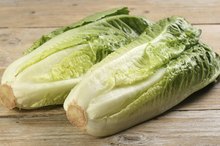Soft Pretzel Nutrition Information
Pretzels make up a part of several European diets -- they originated in Italy or France and eventually became a part of German and Austrian cuisine. Each small soft pretzel contributes approximately 2 ounces of grains to your daily intake; the USDA recommends 6 to 7 total ounces of grains each day. Soft pretzels contain essential nutrients that your body needs for good health, but they also have some nutritional drawbacks. Consume them in moderation as part of a balanced diet.
Calories and Macronutrients
A small soft pretzel contains 210 calories, or roughly 10 percent of the calories in a standard 2,000-calorie diet. Approximately 84 percent of these calories come from carbohydrates, and each pretzel contains 43 grams of total carbs, including about 1 gram of fiber. Each small pretzel also provides a small amount of protein -- 5 grams -- and 2 grams of fat. Watch your portion size when consuming soft pretzels. While small versions contain a moderate amount of calories, medium and large soft pretzels pack a hefty caloric punch at 389 and 483 calories, respectively.
Essential Vitamins
The Health Benefits of Grits
Learn More
Soft pretzels provide you with beneficial B-complex vitamins, especially vitamins B-3, or niacin, and B-1, also called thiamine. Each small pretzel contains 2.6 milligrams of vitamin B-3 -- 19 percent of the recommended daily B-3 intake for women and 16 percent for men, recommended by the Institute of Medicine -- and also provides 25 and 21 percent of the recommended daily B-1 intakes for women and men, respectively. Both vitamins support your metabolism and help you convert carbs into energy. Vitamin B-3 also supports your body's hormone balance, helping synthesize hormones needed for reproductive health and responding to stress.
Beneficial Minerals
Soft pretzels can provide some beneficial minerals, especially iron and selenium, but also sodium, a mineral with a less-than-stellar reputation. When possible, opt for unsalted soft pretzels; they contain less than half the sodium of the salted varieties. Iron supports your metabolism and helps ensure that your tissues get the oxygen they need to function, while selenium keeps your tissues healthy by neutralizing harmful chemicals, called free radicals. Each small pretzel contains 11 micrograms of selenium -- one-fifth of your recommended daily selenium intake, according to the Institute of Medicine -- and also provides 13 and 30 percent of the recommended daily iron intake for women and men, respectively.
Fitting Pretzels Into Your Diet
Nutritional Value of Mesclun Greens vs. Romaine Lettuce
Learn More
While they provide some health benefits, soft pretzels should not make daily appearances in your diet. Many soft pretzels are made from refined grains -- those that have had the nutrient-packed germ and bran removed -- which makes them less healthy than whole-grain foods. Eat them in moderation -- perhaps as a weekly treat -- and make sure you pair them with healthful toppings. Choose yellow or Dijon mustard over fatty condiments, and choose smaller versions with fewer calories.
Related Articles
References
- North Dakota State University Extension: Prairie Fare: Pretzel’s History Is a Bit Twisted
- University of Maryland Medical Center: Iron
- University of Maryland Medical Center: Selenium
- University of Maryland Medical Center: Vitamin B-1 (Thiamine)
- University of Maryland Medical Center: Vitamin B-9 (Folic Acid)
Writer Bio
Sylvie Tremblay holds a Master of Science in molecular and cellular biology and has years of experience as a cancer researcher and neuroscientist. Based in Ontario, Canada, Tremblay is an experienced journalist and blogger specializing in nutrition, fitness, lifestyle, health and biotechnology, as well as real estate, agriculture and clean tech.









